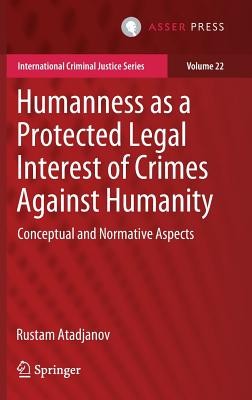
- We will send in 10–14 business days.
- Author: Rustam Atadjanov
- Publisher: T.M.C. Asser Press
- ISBN-10: 9462652988
- ISBN-13: 9789462652989
- Format: 15.6 x 23.4 x 2.1 cm, hardcover
- Language: English
- SAVE -10% with code: EXTRA
Humanness as a Protected Legal Interest of Crimes Against Humanity (e-book) (used book) | bookbook.eu
Reviews
Description
Central to this book is the concept of humanity in international law. It traces the evolution of that concept within international law, studies the existing theories of crimes against humanity, and lays out its own theory based on an inclusive view of "humanity". Crimes against humanity are core crimes under international law; their modern definition is found in the Rome Statute. However, their protective scope remains unclear, with the exact meaning of "humanity" left undefined in law.
The proposed theory argues that "humanity" should be understood as "humanness" and crimes against humanity should be criminalised because humanness constitutes these crimes' valid protected interest. This volume in the International Criminal Justice Series offers an analysis of the German doctrine of Rechtsgut to justify the penalization of crimes against humanity at both domestic and international levels.This is the first monograph on crimes against humanity written by an author from the Commonwealth of Independent States (CIS) aimed at an international audience, and should constitute a useful tool for academics, students and practitioners of international law.
Rustam Atadjanov, LLB, LLM, Dr.jur., attained his Ph.D. at the University of Hamburg in Germany and is a former Legal Adviser to the Regional Delegation of the International Committee of the Red Cross in Central Asia, Tashkent, Uzbekistan.
EXTRA 10 % discount with code: EXTRA
The promotion ends in 20d.19:09:17
The discount code is valid when purchasing from 10 €. Discounts do not stack.
- Author: Rustam Atadjanov
- Publisher: T.M.C. Asser Press
- ISBN-10: 9462652988
- ISBN-13: 9789462652989
- Format: 15.6 x 23.4 x 2.1 cm, hardcover
- Language: English English
Central to this book is the concept of humanity in international law. It traces the evolution of that concept within international law, studies the existing theories of crimes against humanity, and lays out its own theory based on an inclusive view of "humanity". Crimes against humanity are core crimes under international law; their modern definition is found in the Rome Statute. However, their protective scope remains unclear, with the exact meaning of "humanity" left undefined in law.
The proposed theory argues that "humanity" should be understood as "humanness" and crimes against humanity should be criminalised because humanness constitutes these crimes' valid protected interest. This volume in the International Criminal Justice Series offers an analysis of the German doctrine of Rechtsgut to justify the penalization of crimes against humanity at both domestic and international levels.This is the first monograph on crimes against humanity written by an author from the Commonwealth of Independent States (CIS) aimed at an international audience, and should constitute a useful tool for academics, students and practitioners of international law.
Rustam Atadjanov, LLB, LLM, Dr.jur., attained his Ph.D. at the University of Hamburg in Germany and is a former Legal Adviser to the Regional Delegation of the International Committee of the Red Cross in Central Asia, Tashkent, Uzbekistan.


Reviews